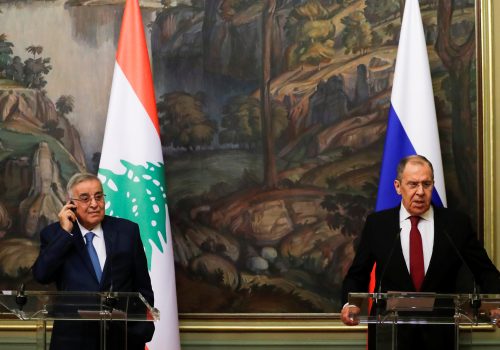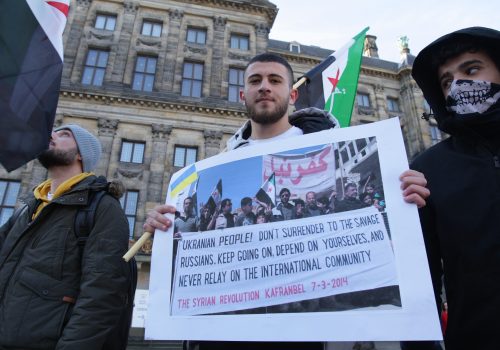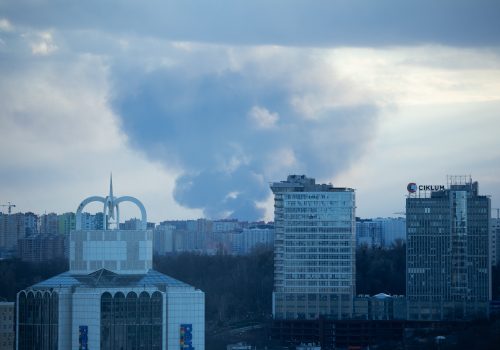Israel won’t stick out its neck for Ukraine. It’s because of Russia.
Russia seeks to regain its privileged global position. For years, it has been acting to erode the American primacy—and consequential unipolar world order—impeding its desired resurgence. Rather than being motivated by territorial expansionism or irredentism alone, Russia’s invasion of Ukraine is Moscow’s latest attempt to shake the international order and revive multipolarity—much like its incursions into Georgia in 2008, Ukraine in 2014, and Syria in 2015.
Despite the global consequences of this ostensibly localized conflict—particularly for US allies—the international response to Russia’s aggression has been inadequate, particularly from Western states. Even Israel, which counts itself as a western democracy and depends on American ascendancy and the endurance of the liberal world order for its security and survival, has fallen short of expectations.
Israel’s sympathies are clearly with Ukraine. Israelis have rallied for Ukraine, sometimes in the thousands, privately donated aid, and even joined Kyiv’s fighting ranks. The Israeli government also assists Ukrainians, shares intelligence, sends the beleaguered country various forms of humanitarian aid, accepts Ukrainian refugees occasionally, and has built a field hospital. Additionally, Jerusalem voted for the United Nations General Assembly Resolution condemning Russia’s invasion on March 2 and March 24, while convincing its newfound ally, the United Arab Emirates, to follow suit. However, over the last decade, regional developments have forced Israel to balance its moral sense regarding the Russia-Ukraine conflict against its vital national interests.
Though historically one of Israel’s most bitter foes, Moscow has sought warmer relations with Jerusalem since the dissolution of the Soviet Union. This process accelerated under President Vladimir Putin, whose unexpected fondness for Jews—possibly stemming from a belief in the omnipotence of “World Jewry”—has left him relatively favorably disposed towards their nation-state.
Israeli decision-making hasn’t prioritized remaining in Moscow’s good graces for decades and, normally, Putin’s friendliness alone wouldn’t suffice to decouple Israel from the pro-American or pro-Western camp. However, that changed when Russia reentered the region as a major player with its 2015 incursion into Syria, becoming Israel’s de facto newest neighbor. As an anonymous senior Israeli official said to me, the invasion of Ukraine demonstrates that “Putin is not an easy neighbor to have.”
In theory, Israel possesses the upper hand in Syria. Russia is a spent force, with an aging military, that is engaged in a limited and distant operation, while the rest of its armed forces are now increasingly bogged down in Ukraine (and, as far as can be seen, are underperforming against Ukrainian forces). Israel, by contrast, possesses economic vitality, a strong and technologically advanced military that operates close to home, and internal cohesion, making it perhaps the region’s most stable and powerful country. But Israel’s concerns over Putin’s proximity and capriciousness stem less from their balance of forces and more from the existential fear that the Jewish state has lived with since its inception.
Israel is a small and narrow country whose very existence has long been rejected—often violently—by its neighbors. What acceptance it has achieved has been recent and largely with autocratic regimes of dubious durability, while people-to-people ties have lagged. The volatility that has rocked the Middle East over the past decade has only heightened Israel’s fears, with two concurrent factors proving the most concerning for Jerusalem: accelerated Iranian expansionism and American contraction.
Iran has vowed to annihilate Israel and, whatever its chances of ultimate success, has taken concrete steps to do so—including positioning its constellation of “Resistance Axis” proxy militias on three of Israel’s borders, upgrading their arsenals with increasingly accurate and longer-range missiles, and pursuing its capability to reinforce these militias with a nuclear umbrella. The Islamic Republic and its proxies have also sought to develop the ability to operate behind Israeli lines, including sowing chaos within the West Bank—which overlooks Gush Dan, Israel’s vital nerve and population center—and igniting ethno-religious violence between Arab and Jewish Israelis.
Meanwhile, the United States—Israel’s traditional guarantor and central ally—has been reducing its global and regional footprint, which have historically been a central pillar of Israeli security. Israel is concerned that the rise of the progressive left and isolationist right in US politics—each with their own negative dispositions towards the Jewish state—will fundamentally weaken the US-Israel relationship. Additionally, Washington has been pursuing a nuclear deal with an unrepentant Iran that, as the Israelis see it, would temporarily limit Tehran’s nuclear program while unlocking increased funding for its proxies.
These regional shifts have left the Israelis fearful of antagonizing a seemingly regionally resurgent Russia and, conversely, open to its inducements—even if they are mirages. Cognizant of this, the latter has used a combination of reassurances and threats to neutralize the Israelis, particularly since it invaded Ukraine. Russia has been particularly successful in leveraging its presence and Israel’s security interests in Syria to that end, even though Moscow and Jerusalem are on opposite sides of the Syrian conflict (the former is allied with Iran and Lebanese Hezbollah to save Bashar al-Assad, while the latter is forcefully opposing Tehran and its Lebanese proxy’s entrenchment in Syria).
Russia has convinced the Israelis that it will safeguard the latter’s security interests in Syria so long as Israel doesn’t impede Russian military operations there. In 2018, Moscow falsely made Israel believe that it would, or could, eject Iran from Syria—or at least prevent Tehran and its proxies from deploying along Syria’s southern border with Israel. Russia also maneuvered Israel into a “deconfliction mechanism” by exploiting Jerusalem’s concerns that Moscow could use its S-400 anti-aircraft system to prevent Israeli airstrikes against Hezbollah and Iran in Syria. According to some estimates, Israel has, since 2017, reportedly carried out more than four hundred airstrikes against Iran and its allies in Syria and across the Middle East. Per this arrangement, Israel can continue striking in Syria while avoiding inadvertent clashes with Russian troops.
But these ostensibly mutually-beneficial agreements are increasingly proving to be a Russian albatross around Israel’s neck. For example, since the onset of its invasion of Ukraine, Russia has leveraged this deconfliction mechanism to keep Israel from fully supporting American-led efforts in favor of Ukraine. At various points during the war, Russia signaled its intention to cancel the arrangement and shut Syrian skies to Israeli aircraft if Jerusalem harms Russian interests. Russia responded to the Israeli Foreign Ministry’s cautious support of Ukraine’s “territorial integrity and sovereignty” on February 23 by immediately summoning the Israeli ambassador to Moscow and condemning Israel’s occupation of the Golan Heights at the UN Security Council (UNSC).
Though this latter move echoed Russia’s longstanding positions, the timing—shortly after the Israeli Foreign Ministry’s statement and hours before Russian forces attacked Ukraine—seemed intended to send a message. Moscow later insisted that it would continue coordinating with Israel in Syria—even after Foreign Minister Yair Lapid sharply condemned Russia’s invasion of Ukraine—but Jerusalem understood the message.
Israel has, therefore, refrained from taking actions that could directly harm Moscow’s interests. This has included avoiding co-sponsoring the United States’ condemnation of Russia at the UNSC, imposing its own sanctions on Moscow, and occasional equivocation in condemning Russia’s aggression against Ukraine. Jerusalem has also denied Ukrainian requests for military aid—including defensive or non-lethal assistance or permitting third-party countries to transfer Israeli-made weapons to the Ukrainians—and maintained its refusal to sell the Pegasus spyware to Kyiv. Furthermore, Israel has repeatedly refused to sell Kyiv its Iron Dome missile defense system, though this platform would be of questionable utility to the Ukrainians in their fight against Russia.
The easy response would be to condemn the Israelis for hesitating to make the morally-correct choice and throw their full support behind Ukraine. But, as the Israelis see it, morality—or, rather, moralizing and grandstanding—matters little when aggressors can act with impunity while the international community contents itself with offering victim states little more than agonized pronouncements of support. Most alarming to US-dependent countries in the Middle East, the international community’s response—including that of the United States and Europe—has largely relied on sanctions to deter Russia’s aggression, while providing the Ukrainians with limited armed support to fend off Russia alone.
If Russia decides to turn its negative attention to Israel or uses its regional military presence as an umbrella to enable the Jewish state’s enemies to do so, it’s quite clear that none of those hoping to counter Russian aggression against Ukraine with their “thoughts and prayers” will do any more for Israel. Israel—whose founding raison d’etre and continued vocation is the protection of the Jewish people—also worries that angering Putin will lead him to retaliate against Jews in Ukraine and Russia.
Israel’s assessment of this reality is overall correct. Where it errs, however, is in failing to perceive the direct, if long-term, impact that Russia’s invasion of Ukraine will have on Israeli safety and security. The conflict in Ukraine is indeed distant. But it is a milestone along Russia and similarly-minded actors’ paths of creating the type of world that Israel should fear the most—one where its security and even survival cannot be guaranteed. If they succeed, American power will be curtailed, concurrently ending the rules-based international order and any constraints, however superficial they may seem, on the harmful activities of the world’s most destabilizing actors (some of which are the Jewish state’s most implacable foes). If such a reality comes about, Washington’s competitors like China or Russia—whose interests align more with Israel’s adversaries—will never act as alternative guarantors of the Jewish state’s security or existence.
Israel is a small country in the Middle East. It can’t be expected to stick its proverbial neck out on Ukraine farther than other, more obviously interested, powerful, or close actors. But, as those countries most keen on preserving the American-led liberal world order mobilize in its defense, Israel must be prepared to do the same.
David Daoud is a nonresident fellow at the Atlantic Council. He is also the director of Lebanon, Israel, and Syria research at UANI. Follow him on Twitter: @DavidADaoud.
Further reading
Fri, Mar 4, 2022
Russia’s invasion of Ukraine impacts the Middle East too
MENASource By
Together with Russia's strategic importance to Iran, this anti-American approach, which is very prominent in Iranian leadership and affects its foreign policy, will continue to play an essential role in the Iranian reaction to the war in Ukraine.
Wed, Mar 9, 2022
The Russian invasion of Ukraine happened because the world gave Vladimir Putin a free pass in Syria
MENASource By
Now that the world can finally—albeit belatedly—see Vladimir Putin for what he is, Syrians hope that the world views their plight for democracy and freedom in Syria with more solidarity.
Fri, Mar 25, 2022
The Ukraine crisis is a reminder of why conflict-driven carbon emissions matter in MENA and beyond
MENASource By Ariel Ezrahi
The current Ukraine crisis is an alarming reminder that, as senseless wars continue to rage in the twenty-first century, the uphill struggle to combat climate change just got steeper.
Image: A man carries the flag of Ukraine near the Western Wall, Judaism's holiest prayer site, as part of the Colel Chabad annual bar mitzvah celebration which includes refugees from a Ukrainian orphanage, in Jerusalem, April 11, 2022. REUTERS/Ammar Awad


